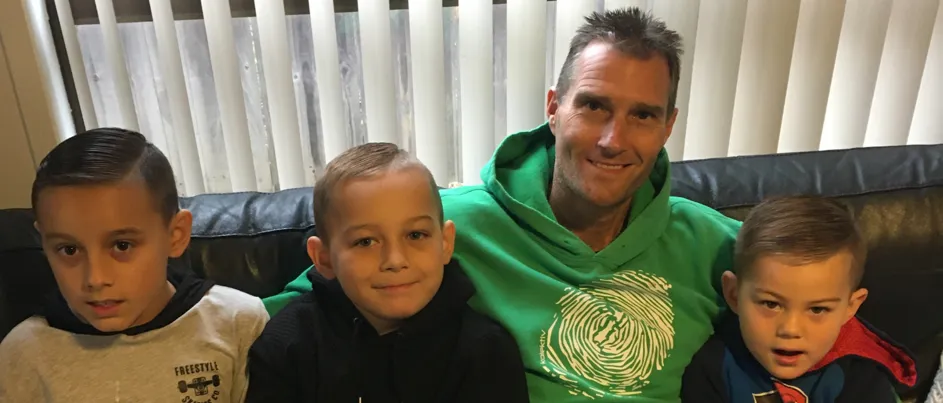
I thought I was just getting fitter. I was losing weight, people noticed and I saw it as a good thing. But things started to change. My digestion got worse and I had this constant feeling that something wasn’t right.
Michael's Story
When Michael was diagnosed with pancreatic cancer in 2012, he had just turned forty. Life was busy working as an arborist, raising a family and navigating the everyday demands of life. The news came as a shock, as it so often does with pancreatic cancer. Like many, he had no warning signs, no real symptoms that stood out, just a few subtle changes that, in hindsight, pointed to something much bigger.
Pancreatic cancer is often asymptomatic in its early stages, making early detection a challenge. For Michael, the earliest sign was a shift in his digestion and overall energy levels.
“One day, I suddenly needed to go to the bathroom in the middle of a shift. I thought it was strange, but I didn’t make much of it. Over time, it became more frequent, but I brushed it off.”
Signs and Symptoms
This continued for months with small but consistent changes. At the same time, Michael started losing weight. It seemed like a natural result of his physically demanding job, flying in and out of Central Queensland, working long hours. But looking back, he realises it was another sign that something was wrong.
“I thought I was just getting fitter. I was losing weight, people noticed and I saw it as a good thing. I even started jogging to keep it off. But things started to change. My digestion got worse and I had this constant feeling that something wasn’t right.”
Then came the pain. Michael had a couple of intense pancreatic attacks that left him debilitated. Eventually, he saw a GP, who recognised the red flags and called him in after hours for an urgent consultation.

Michael travelling around Australia
Diagnosis
“He mentioned for the first time the risk of cancer. I’d had these pancreatic attacks, brutal pain like nothing I’d ever felt. That was the moment I knew something was seriously wrong.”
From there, things moved quickly. His GP referred him to a specialist and in November 2012, Michael sat across from a surgeon at the Princess Alexandra Hospital in Brisbane.
Treatment
“He told me straight up, ‘You’re going to need a major operation.’ And I said, ‘Is this the Whipple?’ He looked at me and said, ‘You’ve been doctor Googling, haven’t you?’”
A Whipple procedure is a very complex operation that requires a surgeon with a lot of skill and experience. To have the best outcome, it’s important to be treated by a surgeon who does many of these operations and to have the surgery at a hospital where many of them are done. The NSW Cancer Institute defines high volume centres as centres performing a minimum of 6 pancreatic surgeries per year.
“The surgeon got it all, and that was it. No follow up chemo, no radiation. It was a massive operation, but it saved my life.”

Michael enjoying time at the beach
Life after treatment - an unexpected turn
Michael recovered well, but six months after surgery, while on a camping trip, his health took another hit. Severe fatigue set in, leaving him struggling to walk even a few metres. A trip to the hospital revealed an ulcer in his stomach, pushing him into severe anaemia. It was another close call, but thanks to his medical team he was able to successfully treat the issue.
Although this outcome was successful, post-surgery wasn’t smooth sailing. A few years later, routine scans revealed spots on his liver. The prognosis was grim.
It was this news that, what some may refer to, was the straw that broke the camel's back. With an intense pile up of all his recent health scares, Michael overhauled his lifestyle, stripping back stress and focusing on whole, unprocessed foods.
A prognosis that shifted his lifestyle completely
“My diet flipped 180 degrees. Looking back, I realise I wasn’t nourishing my body the way I should have. I used to love KFC, pizza, all the quick, easy options. Now, I make everything from scratch, using organic produce. I cut out alcohol completely and it’s changed my quality of life.”
He also learned the importance of slowing down and being grateful for the simpler things in life.
“I made things as simple as possible to reduce stress, to take care of myself properly. I sold most of my possessions and have been living off the land ever since.”
Finding Pankind in the search for community and answers
Michael spent years searching for more information and communities that could relate to his experience with pancreatic cancer. He wanted to connect with people who truly understood what he was going through.
“I spent years trying to find information and support groups, and that’s when I found Pankind.”
Since discovering Pankind, Michael has felt motivated to share his journey, offering guidance and encouragement to others facing similar challenges. While he acknowledges that there are factors beyond anyone’s control, he believes in doing what he can to live well.
“When people call me for advice, I tell them the truth, it’s brutal, it’s mentally tough and you have to push through. But you do what you can. You have to take care of yourself.”
Pancreatic cancer remains one of the most challenging cancers to treat and not everyone gets the same outcome as Michael. But his journey highlights the importance of early detection, access to the right medical team and taking proactive steps towards leading a healthy mindful life.
Thank you Michael for sharing your story so openly and generously.
